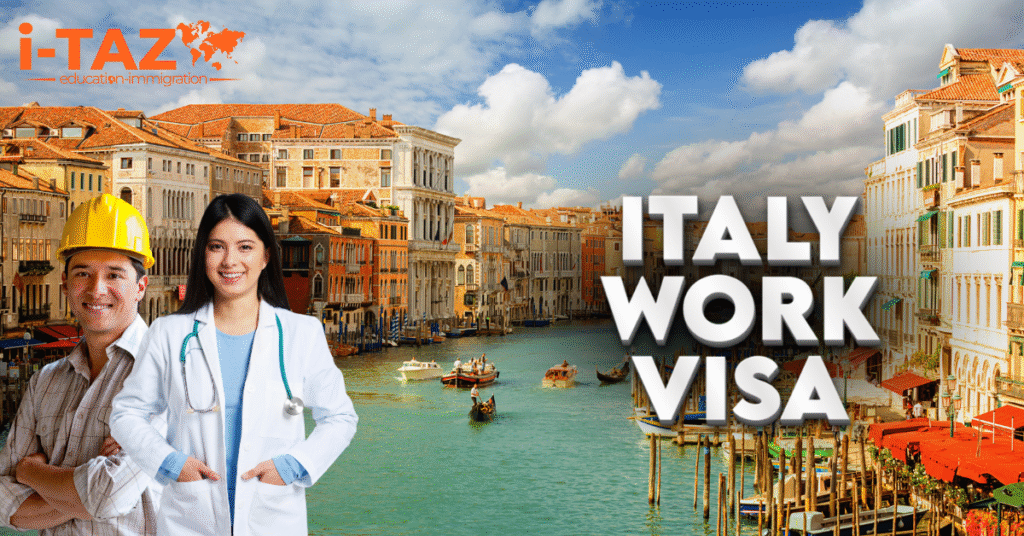Introduction
Italy is not only known for its rich culture, history, and breathtaking landscapes but also for being a country that attracts workers from all around the world. With its growing industries, high demand for skilled labor, and access to the European Union job market, many professionals dream of moving to Italy for employment. If you are considering building your career in Europe, the Italy Work Visa could be your gateway to achieving that dream.
Why Choose Italy for Work?
Italy is an attractive destination for international workers because of its:
- Strong economy in sectors like fashion, manufacturing, agriculture, construction, and IT.
- High demand for foreign workers in both skilled and seasonal jobs.
- Access to the EU labor market and Schengen countries.
- Affordable lifestyle compared to other European countries like France or Germany.
- Rich culture and better quality of life.
What is an Italy Work Visa?
The Italy Work Visa, also known as the “National D Visa,” is a type of long-stay visa that allows non-EU/EEA citizens to live and work in Italy legally. To apply, you need an Italian employer willing to hire and sponsor you.
It is part of Italy’s immigration program known as the Decreto Flussi (Flow Decree), which sets annual quotas for non-EU workers.
Types of Italy Visas
Italy offers several types of work visas depending on the kind of employment:
1. Skilled Worker Visa
For highly skilled professionals in sectors like IT, engineering, and healthcare.
2. Seasonal Work Visa
For jobs in agriculture and tourism, typically valid for up to 9 months.
3. Self-Employment Visa
For entrepreneurs, freelancers, or business owners planning to work independently in Italy.
4. EU Blue Card Italy
For highly qualified workers with specialized skills and experience.
Requirements for Italy Work Visa
To apply for an Italy Work Visa, applicants must meet specific requirements:
- A valid job offer or employment contract from an Italian employer.
- Proof of educational qualifications or relevant work experience.
- Valid passport (with at least 6 months’ validity).
- Proof of financial means to support yourself initially.
- Accommodation proof in Italy.
- Health insurance coverage.
- Clean criminal record certificate.
Step-by-Step Process to Apply for Italy Work Visa
Step 1: Employer Application
Your employer in Italy applies for a work authorization (Nulla Osta) from the Italian immigration office.
Step 2: Work Authorization Approval
Once approved, you receive the Nulla Osta, which is required for your visa application.
Step 3: Apply at Italian Embassy
Submit your application with required documents at the Italian Embassy or Consulate in your home country.
Step 4: Visa Processing
Authorities review your application, which may take a few weeks to months depending on quotas.
Step 5: Travel to Italy
After approval, you can travel to Italy and apply for a Residence Permit (Permesso di Soggiorno) within 8 days of arrival.
Processing Time of Italy Work Visa
The Italy Work Visa processing time depends on annual quotas and embassy workload. On average, it takes 2–3 months. However, seasonal visas may be processed faster.
Italy Work Visa Cost
- Visa Application Fee: Around EUR 116
- Residence Permit Fee: EUR 40–100 depending on validity
Benefits of Italy Work Visa
- Legal right to live and work in Italy.
- Ability to bring family members under family reunification.
- Pathway to permanent residency after 5 years.
- Access to Schengen travel within 27 European countries.
- Opportunities in diverse industries.
Challenges of Italy Work Visa
While Italy is an attractive option, there are some challenges:
- Annual quotas limit the number of visas issued.
- High competition for jobs in certain sectors.
- Language barrier – Italian is required for most jobs.
- Bureaucratic delays in visa processing.
Conclusion
The Italy Visa is a golden opportunity for non-EU citizens, including Pakistanis and Indians, who want to work and live in Europe. Despite some challenges like quotas and language requirements, the benefits of career growth, legal residency, and the chance to settle in one of Europe’s most beautiful countries make it highly attractive.
For those seeking long-term stability and access to the wider European job market, securing an Italy Work Visa in 2025 could be the key to unlocking new possibilities.









